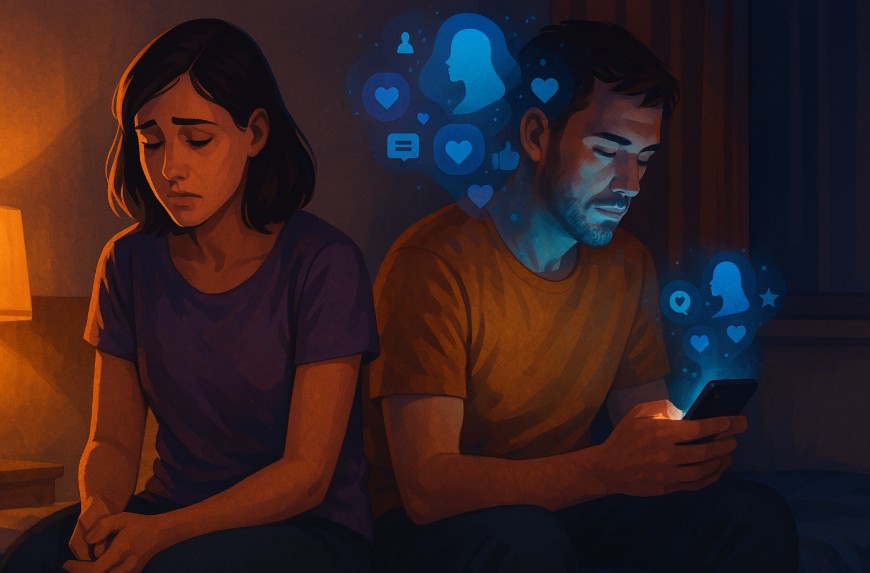Why My Husband Looks at Other Females Online? | 15 Common Reasons
In a world where everything is just a click away, relationships are being tested in new and sometimes painful ways. One question that weighs heavily on many women’s hearts is: “Why does my husband look at other females online?”
This isn’t just about curiosity or scrolling; it’s about the emotional turbulence it causes the feelings of betrayal, inadequacy, and fear of not being enough.
This behaviour, while increasingly common, can deeply damage emotional intimacy and trust. Whether it’s late-night Instagram browsing or quietly liking photos of women on Facebook, the emotional toll it takes can be immense.
While not always rooted in infidelity, the act often signals unmet needs, emotional gaps, or a disconnect in the relationship. This guide breaks down the real reasons behind such behaviour and how couples can move forward together or apart.
What is the Digital Age of Attraction?
How Online Behaviour Affects Relationships
In earlier times, infidelity was clear-cut: a physical affair, a hidden affair, or emotionally investing in someone outside the relationship. Today, however, infidelity can be virtual, existing in comment sections, private messages, and silent scrolling.
The internet offers easy access to a world of temptation. A person may not even leave the couch, yet their actions can shake the very core of a marriage. When a partner constantly engages with suggestive or flirtatious content, it can make their spouse feel emotionally abandoned, even if no physical affair exists.
Social Media and Its Role in Temptation
Apps like Instagram, Snapchat, TikTok, and even Twitter encourage visual engagement. Algorithms promote content based on interactions, and once someone starts engaging with certain types of photos or videos, they are shown even more of the same.
This can create a loop of visual indulgence, where your partner is drawn repeatedly into this behaviour without fully recognising how it affects their significant other.
Is It Normal for Men to Look at Other Women Online?
Human Nature vs. Disrespect
Attraction is natural. But constant or secretive online viewing of other women, especially when it causes emotional distress, crosses into disrespectful territory.
For some men, the habit stems from deeply ingrained social norms where commenting on or viewing women is accepted, even celebrated. But within a committed relationship, this raises questions of emotional loyalty.
What Does It Mean for the Relationship?
If a man consistently views other women online, it might not mean he’s cheating. Instead, it can indicate:
- Emotional dissatisfaction
- Low self-esteem
- A desire for excitement or novelty
- Addictive digital patterns
The real question isn’t just about what he’s doing it’s about how it’s impacting you and the connection you both share.
15 Common Reasons Why Husbands Look at Other Females Online
1. Lack of Emotional Connection

When emotional intimacy fades, people often seek connection elsewhere even if they don’t realise it. For many men, especially those not used to expressing emotions, this disconnection can be confusing.
Instead of addressing the issue directly, they might retreat into the digital world where validation feels effortless and interaction doesn’t require vulnerability.
Why it happens?
- Emotional needs aren’t being met through communication or shared experience.
- Conversations feel surface-level or revolve only around logistics (kids, bills, chores).
- The emotional closeness that once existed has slowly faded, often unnoticed.
Impact: This kind of disconnection may not be intentional, but it can still feel like betrayal to the partner. Looking at other women online becomes a way to feel something, anything even if it’s fleeting and artificial.
2. Curiosity and Novelty

Humans are naturally curious beings. And the internet? It’s a non-stop stream of newness new faces, new styles, new bodies, new lives. For some men, the appeal of scrolling through images of attractive women is less about lust and more about stimulation, exploration, and variety.
Why it happens?
- The brain is wired to crave novelty. New visuals = new dopamine.
- Platforms are designed to keep users engaged with ever-changing content.
- This behaviour often develops as a pattern or habit before becoming conscious.
Impact: While this reason may sound innocent on the surface, it can still leave a partner feeling unimportant or undervalued especially if attention is being spent elsewhere instead of within the relationship.
3. Seeking Validation or Ego Boost
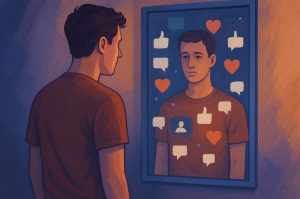
Self-worth is fragile even for people who appear confident. Some men turn to the internet to feel seen, admired, or desired. Even passive behaviours like browsing suggestive photos or following attractive influencers can provide a temporary ego boost that helps soothe deeper insecurities.
Why it happens?
- They may feel unattractive, especially if ageing or dealing with life changes.
- They receive little affirmation or appreciation in everyday life.
- Online content makes them feel desired by association.
Impact: This need for external validation often comes at the cost of internal connection. The more a person seeks ego boosts from external sources, the less they invest emotionally in their partner. Over time, this erodes intimacy and emotional safety within the relationship.
4. Unresolved Relationship Issues

Every relationship goes through ups and downs, but when problems are left unspoken or unresolved, emotional gaps form. If a man feels ignored, nagged, criticised, or unappreciated, he might start avoiding conflict and looking for comfort elsewhere including online.
Why it happens?
- He may not feel emotionally safe expressing dissatisfaction.
- He might fear confrontation or doesn’t know how to resolve issues constructively.
- Online behaviour becomes a distraction from the problems at home.
Impact: This avoidance doesn’t solve the root issues in fact, it usually makes them worse. What begins as emotional retreat often evolves into resentment, further disconnection, and possible emotional betrayal.
5. Habitual Online Browsing
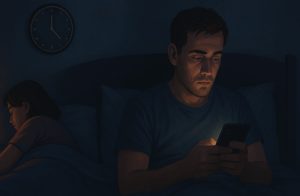
Sometimes, looking at other women online isn’t driven by dissatisfaction or emotional lack. It’s simply become a habit. Many men develop daily scrolling routines on Instagram, Reddit, TikTok, or forums and don’t even realise how much time they’re spending doing it.
Why it happens?
- It started as casual browsing and became part of daily routine.
- Algorithms encourage repeat engagement by showing similar content.
- There’s little awareness of how it may affect their partner emotionally.
Impact: Though seemingly benign, habitual browsing can slowly damage emotional connection by dividing attention and energy. The act may feel harmless to him, but it often feels like rejection or disinterest to the partner who notices it.
6. Influence of Adult Content Consumption

Men who frequently consume adult content may develop unrealistic expectations about physical attraction, body types, or sexual behaviour. This can lead to objectification and emotional disconnection in their real-world relationships. In some cases, it even numbs emotional intimacy altogether.
Why it happens?
- Long-term exposure to adult content can desensitise emotional responses.
- It conditions the brain to respond only to visual stimuli.
- It creates distorted views of attraction and intimacy.
Impact: This influence can trickle into everyday behaviour like scrolling through images of strangers instead of engaging emotionally with a partner. It also makes it more difficult for real intimacy to feel satisfying, which can lead to more emotional distance.
7. Boredom or Escapism

Life can feel repetitive. Between work, bills, responsibilities, and routine, it’s easy for excitement to fade in long-term relationships. Some men turn to the online world as an escape not because they’re dissatisfied with their partner specifically, but because they’re searching for a way to feel something different.
Why it happens?
- Life has become monotonous or overly structured.
- There’s a desire for adventure or fantasy that isn’t being fulfilled.
- Emotional or psychological needs (like stimulation, playfulness, or exploration) are unmet.
Impact: Escapism isn’t inherently bad but when it replaces emotional connection or becomes a secretive behaviour, it creates a rift in the relationship. The partner may feel emotionally abandoned while the other is lost in a fantasy world that doesn’t require emotional responsibility.
8. Emotional Neglect or Unmet Needs

Relationships thrive on emotional nourishment small gestures, affirming words, physical closeness, and deep conversations. When these fade or disappear altogether, one or both partners may feel emotionally starved.
For men, especially those who aren’t sure how to express these feelings, browsing online can become a silent cry for connection.
Why it happens?
- Emotional needs (such as feeling appreciated, respected, or loved) are being overlooked.
- He may not know how to voice what he’s feeling.
- Online content provides a fantasy of being noticed or desired.
Impact: This kind of behaviour can become a coping mechanism for emotional emptiness. The problem is, the digital world only offers a shallow substitute and often deepens the emotional gap in the real relationship.
9. Digital Infidelity Patterns

Not all cheating involves physical touch. In the digital era, many betrayals happen with screens between partners. If a husband is repeatedly seeking out photos, private chats, or engaging with sexually suggestive content in secret, this may be a sign of digital infidelity.
Why it happens?
- He may believe that “looking isn’t cheating.”
- There’s a lack of clearly defined boundaries between partners.
- The anonymity of the internet lowers the perceived consequences.
Impact: Even if no messages are exchanged, the act of hiding this behaviour, especially after being confronted, creates a breach of trust. This emotional secrecy can be as damaging as a physical affair in many relationships.
10. Peer Influence or Male Social Culture

The way men talk in private spaces whether in group chats, work culture, or online communities can normalise the objectification of women. “Checking out” or “rating” women online is often treated as banter or harmless fun. Over time, these attitudes can influence real-life behaviour.
Why it happens?
- Peer validation for “masculine” behaviour.
- Toxic masculinity or locker-room talk.
- Influence from podcasts, influencers, or online communities that downplay respect for women.
Impact: When such behaviours are embedded in daily life, a man may not fully grasp the emotional consequences for his partner. It reinforces behaviours that prioritise image over intimacy, often leading to emotional distance and lack of accountability.
11. Low Impulse Control

For some men, especially those with ADHD or impulse-related tendencies, controlling digital habits can be extremely difficult. The constant accessibility and immediate reward of attractive online content create a cycle of instant gratification that’s hard to break.
Why it happens?
- Difficulty delaying gratification or resisting temptation.
- A lack of awareness of the emotional cost to their partner.
- Brain chemistry that seeks frequent stimulation.
Impact: This isn’t always about desire, it’s about compulsion. But when a man doesn’t take steps to control or be mindful of his behaviour, it can quickly erode trust, respect, and emotional intimacy within the relationship.
12. Addiction to Online Attention
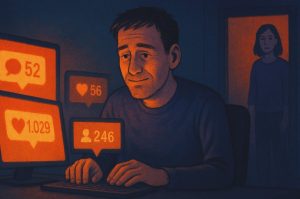
Some men develop an addiction to the feeling of being wanted or engaging with the idea of desirability. Even without interacting directly with others, just looking, liking, or following certain profiles can give them a high, almost like a drug.
Why it happens?
- They feel invisible or unimportant in everyday life.
- The internet offers quick affirmation and attention without risk.
- They may have underlying self-esteem or identity issues.
Impact: This can become a genuine addiction. The more they indulge, the less satisfying real-life connection may feel. Partners on the receiving end may feel like they’re competing with a fantasy, which damages their own sense of worth.
13. Lack of Clear Boundaries
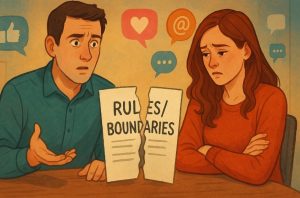
One of the biggest issues in modern relationships is unclear expectations. What one person considers harmless, the other might see as betrayal. If couples haven’t discussed what counts as inappropriate online behaviour, it’s easy for one partner to cross lines without intending to.
Why it happens?
- They assume their actions are “normal” because “everyone does it.”
- There’s been no open dialogue about online conduct.
- They don’t realise how hurtful their actions are until it’s pointed out.
Impact: Without boundaries, resentment festers. It’s not uncommon for partners to feel emotionally gaslighted or dismissed when they bring up concerns that were never mutually addressed to begin with.
14. Crisis of Identity or Midlife Concerns

As men age, they often go through periods of self-reflection. For some, this turns into a midlife crisis, a fear of losing desirability, relevance, or excitement. Online content becomes a gateway to revisit youth, fantasy, or the illusion of choice.
Why it happens?
- Insecurity around ageing or physical decline.
- Regret over lost opportunities or life choices.
- A desire to feel youthful, attractive, or in control again.
Impact: This can be incredibly painful for the partner, who may feel replaced or devalued. If not addressed, this behaviour may escalate sometimes leading to emotional or physical infidelity.
15. Dissatisfaction They Can’t Express

Perhaps the most complex of all: a man may feel something is missing in the relationship but doesn’t know how to express it without causing hurt. Instead of communicating, he buries his discomfort in virtual distractions.
Why it happens?
- Fear of hurting their partner’s feelings.
- Lack of emotional vocabulary or communication skills.
- A belief that “looking online” is a safer outlet than voicing dissatisfaction.
Impact: This indirect form of emotional disconnection erodes trust and intimacy over time. If one partner is coping silently online, and the other is suffering in silence emotionally, the relationship becomes a quiet battlefield each hurting in different ways.
Is This Behaviour Considered Emotional Cheating?
Emotional cheating occurs when your partner forms a connection emotional or visual that they hide or protect from you. If your husband consistently views other women and downplays or hides it from you, it’s a breach of emotional transparency.
The Blurred Lines of Online Behaviour
Each couple has their own definition of what crosses the line. For some, liking a bikini photo might be a non-issue. For others, it feels like a gut punch. What’s most important is mutual understanding and communication.
How It Impacts a Marriage Emotionally?
Effects on Trust and Self-Worth
Discovering your partner’s behaviour can:
- Make you question your own attractiveness
- Create a sense of comparison
- Undermine intimacy and safety
- Spark long-term trust issues
Long-Term Relationship Damage
Unchecked, digital habits can create deep emotional wounds, especially if one partner dismisses the other’s feelings. This can lead to:
- Chronic resentment
- Loss of affection
- Decreased communication
- Emotional detachment
How to Respond Without Losing Yourself?

When to Talk, When to Listen
Timing matters. Avoid confronting your husband when you’re furious. Instead, say something like:
“I noticed something that hurt me. Can we talk about it honestly?”
Use non-confrontational language to avoid triggering defensiveness.
Setting Digital Boundaries in Marriage
Digital boundaries might include:
- Not following or liking suggestive accounts
- Not deleting search history or using incognito mode
- Sharing social media expectations
- Having open conversations about comfort levels
Understanding Your Emotional Triggers
Ask yourself:
- Is this triggering past trust issues?
- Is it rooted in comparison or fear?
- What do I need to feel emotionally safe?
Seeking Counselling or Therapy
A licensed counsellor can help both partners unpack emotions, triggers, and needs. Therapy isn’t just for relationships in crisis it’s for those who want to protect what they have.
Rebuilding Trust After Online Betrayal
Can Trust Be Restored?
Yes, but it takes:
- Honest acknowledgement
- Consistent change in behaviour
- Time and transparency
- Emotional effort from both sides
Healing Together or Apart
In some cases, separation offers clarity. In others, healing is possible through deep introspection, shared growth, and commitment to change.
When It’s a Sign of Deeper Marital Issues?
Red Flags vs. Relationship Road Bumps
If your husband is:
- Deleting online history
- Dismissing your pain
- Gaslighting your concerns
- Spending excessive time online at night
…it may be more than just a “bad habit.”
Knowing When to Seek Outside Help
Persistent emotional distress is reason enough to seek therapy you don’t need to wait until things are “bad enough.”
Online Behaviour vs. Relationship Health Indicators
| Online Behaviour | Potential Indicator in Marriage |
| Following many attractive women | Seeking validation or novelty |
| Hiding browsing history | Breach of trust or guilt |
| Spending more time online | Avoidance or emotional disconnection |
| Defensive when asked | Unacknowledged emotional boundaries |
| Repeated behaviour after talking | Lack of commitment to change or deeper issue |
| Comparing partner to others | Emotional dissatisfaction |
Wondering why my husband looks at other females online isn’t just a passing thought, it’s an emotional weight. But it also presents an opportunity: to rebuild, reconnect, or reassess what you truly need from the relationship.
Whether you move forward together or take separate paths, the goal should always be emotional honesty, mutual respect, and your own well-being. You deserve to feel valued and seen in real life and online.
FAQs
Is it wrong if my husband follows attractive women online?
It depends on context and intention. But if it hurts your emotional well-being, it warrants a conversation.
How can I confront my husband without sounding jealous?
Approach it as a need for emotional clarity, not jealousy. Share your perspective and how his actions affect you.
What if he denies doing anything wrong?
Try to focus on how it makes you feel rather than proving he did something bad. Emotions are valid even if intentions weren’t malicious.
Can this be considered micro-cheating?
Yes, especially if done secretly or if it creates emotional distance in your relationship.
How do I rebuild my self-esteem after feeling compared?
Reinvest in your own self-worth through self-care, affirmation, and possibly therapy. Remember: his behaviour doesn’t define your value.
Should I monitor his online activity?
It’s better to seek transparent communication than engage in policing. Monitoring may worsen trust.
When is it time to consider therapy or separation?
If emotional pain persists, communication breaks down, or trust cannot be restored despite efforts, therapy or space may be essential.

